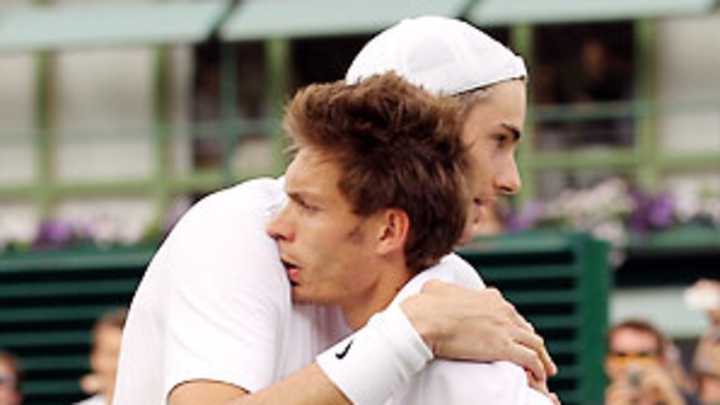It's hard to express the sheer awesomeness of Isner vs. Mahut

• It's a challenge to find the words to do justice to this surrealistic match -- even both combatants described it as dream-like -- a three-day infomercial for courage that ended 70-68 in the fifth set. The word I scribbled multiple times was "heroic," but even that feels inadequate. But numbers help put it in perspective. Consider that Roger Federer beat Andy Roddick 16-14 in an "epic" fifth set in the 2009 final. The fifth set of this match was 108 (!!) games longer. Both players hit more than 100 aces. The players went 167 games without breaking serves. Francesca Schiavone played 138 games en route to winning the French Open. Isner and Mahut played 138 games in the fifth set.
Much as we resist clichés, it is truly a shame there was a loser today.
• Tradition giveth and tradition taketh away. If Wimbledon were less resistant to change, they would have converted to a fifth set tiebreaker -- as the U.S. Open has done -- and deprived us of this momentous match. Mahut or Isner wins 7-6 in the fifth set and only hard-core fans even know they played each other. On the other hand, given the hype and excitement, it would have been better had the event broken with custom and put the math on Centre Court. Yes, suspended matches are supposed to resume on the court they began. But given the extenuating circumstances here -- the world watching for the outcome -- it was shame that this didn't play out before 15,000 fans on the sport's most hallowed venue.
• Spare a thought for Mahut. Isner, apart from moving on, is on the cusp of the top 20. He's a likable American surrounded by an entourage. He has a college degree. He'll be fine. But what of Mahut? He's 28, deep into the back nine of his career. He qualifies at Wimbledon and plays a starring role in the longest (and, in a perverse way, most gripping) match ever. And what does he get for it? First-round-loser prize money and a commemorative bowl? Not even a year's supply of turtle wax. One of you readers noted that even if Francesca Schiavone had lost the French Open final, at least she'd have received a six-figure check and a boatload of ranking points. Mahut gets neither.
There are winners and losers in sports -- those are the rules of engagement. We get that. But there's something almost cruel about being part of a global sports event and walking away, yes, with pride and respect and gelled head high, but no material trappings. You wish there were a slush fund that tennis leaders could dip into and somehow reward an effort that gave so much dignity to the sport.
• The post-match press conference contained some revelations, not least Isner's declaration that Wimbledon should not have a fifth-set tiebreaker.
"I don't think so," Isner said. "Nothing like this, it won't happen again. Not even come close, so I think just keep it the same."
Like most fans, he sensed the surreality: "Honestly, when I left the match, I really thought it was a dream. I didn't think that type of match was possible," he said. "So I was really expecting to wake up, in all seriousness. I didn't sleep great. I only slept for four hours. I talked to Nic. He said he only slept for about three. So we're both kind of running on fumes right now. Yesterday, I didn't know what I was thinking out there, especially once the match got past, you know, 25-all. I wasn't really thinking. I was just hitting a serve and trying to hit a forehand winner is the only thing I was doing. Fortunately, that was going in on my service games. He was serving great and hopping around eight hours into the match, which was remarkable."
Isner could not explain why the match went so long: "Obviously we both served really well," he said. "That's the main thing. But even in that case, you can't even imagine it going past 20-all. I don't know. I guess it was just meant to be or whatever. You know, I mean, in a way I'm kind of glad it happened, although I am pretty tired. It's pretty nice to be a part of that match."
Remarkably, Isner said he thinks he can still keep winning. "I'm going to do everything necessary to get myself ready for tomorrow," he said. "I know my opponent; he's not the freshest one either. Not nearly like me. But I think I can I definitely think I can win." Don't forget, too, that his next opponent, Thiemo De Bakker, won his first round match 16-14 in the fifth set.
• A big assist must go to Rodney Marshall, a trainer Isner retains when he's on the road. After Isner took an ice bath last night and ate massive quantities of Italian food -- hand delivered by Andy Roddick -- Marshall went to work, massaging Isner, keeping him hydrated, making sure he got as much sleep as possible and then waking up to another round of hydration. While Isner plainly looked spent at the match's end, it's remarkable that he never cramped or allowed fatigue to affect his serving, which still was still clocking 135 mph late in the match.
Says Marshall: "It was a team effort, the USTA, the ATP, it seemed like everyone in tennis [chipped in] to make sure both guys were ready to go. This shows how hard John works on his fitness during the year. He got through because of what he's done in the months leading up."
